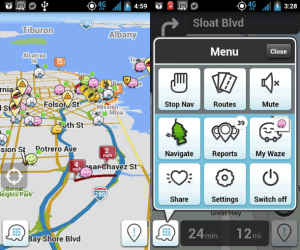Waze – Crowdsourcing Maps and Traffic Information
Waze is the world’s largest community-based traffic and navigation app which enables drivers to share real-time traffic and road info, saving other local drivers time and gas money on their commute. Like other GPS software, it learns from users’ driving times to provide routing and real-time traffic updates. What distinguishes Waze, however, is that its users can report accidents, traffic jams, speed and police traps, and from the online map editor, can update roads, landmarks, house numbers, etc. Hence, the real value that Waze creates (over and above other mapping software such as Google Maps) is by crowd-sourcing and leveraging its users’ actions on the app.
Waze is a typical network-based business with strong direct network effects that are local in nature. As more users join the platform, more users become available to provide Waze with the value-creating information, making the app more valuable and compelling for existing users to use and new users to download.
Most crowd-sourcing business models face issues with incentivizing participation and managing the crowd on their platform. Waze incentivizes user engagement via gamification techniques. To quote the Waze co-founder Di-Ann Eisnor, “The first [step] was making it fun for people to create roads and get points and those early adopters were really into helping people.” This also helped Waze overcome the classic chicken-and-egg problem which most network-based businesses face: Acquiring a critical mass of users that can make the platform useful.
Waze’s value creation is fairly straightforward to understand: Waze helps de-congest traffic, which in addition to having a positive environmental impact, saves drivers fuel and time that would otherwise have been spent on the road during peak traffic hours. The key is that this value creation happens through the crowd: This is something that a piece of software would not be able to do as well. E.g., Software would not be able to interpret special situations such as accidents, traffic re-routing by police, etc. as well as humans can. Hence, this crowd-sourced model can potentially help unlock greater value for other technologies such as driverless cars – potentially, one of the important reasons for Google’s acquisition of Waze.
Waze is free to download and use for consumers. The value is captured via advertisers. Waze offers resellers and advertisers a web interface to advertise based on locations : Small ad-icons appear on the Waze maps for an interested Wazer to engage with. In addition, Waze offers TV news stations a web interface to broadcast current traffic reports and alerts directly from the Waze app; the service has already been used by 25 TV U.S. news stations. Location based advertising is one of the hottest things in advertising currently, demanding premium click-through rates. Given this, the monetization and growth potential of Waze’s business model is huge.
A potential concern that has commonly been voiced about Waze is that the prospect of more drivers using Waze has the potential to distract them with a flurry of icons and notifications and put them at greater risk of an accident. Such road-safety issues, if proven, would be an example of a negative network effect that platforms face, when the network becomes larger than the optimal size. These issues are, however, easy to resolve via minor tweaks in the product, such as showing only the top X most relevant icons per unit area on the Waze map.
Sources:
http://techcrunch.com/2012/07/05/waze-20-million/
https://www.youtube.com/watch?v=WWP4oTSEv5A
http://nymag.com/daily/intelligencer/2013/06/did-google-just-buy-a-dangerous-driving-app.html
http://www.adweek.com/news/technology/waze-maps-out-native-ad-platform-145035
http://www.forbes.com/sites/parmyolson/2013/06/13/what-waze-adds-to-google-a-view-from-wazes-ceo/



